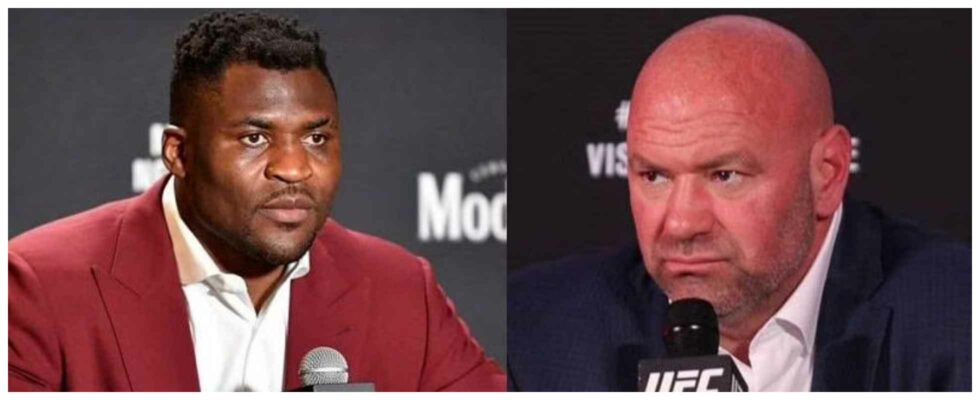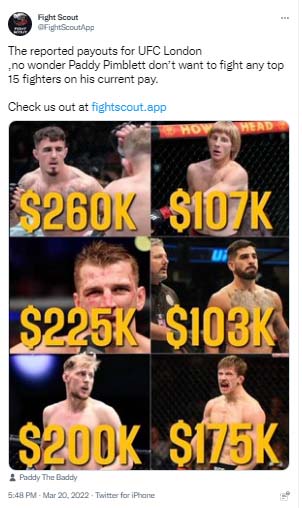If you’ve ever googled a name of a UFC athlete along with net worth you might’ve seen fictional reporting.
After each and every event these postings get shared everywhere online. While most completely avoid addressing sources some mention they are merely estimates based on previous payouts.
To put things into perspective here’s a recent example. Following UFC London held in March of 2022 the following picture went viral.
Said tweet specifically mentioned Paddy Pimblett – a particularly egregious case. Despite being a former Cage Warriors champion, Pimblett signed with the UFC on the bare basic contract.
Pimblett talked to Dave Portnoy of Barstool sports and revealed he only made $12,000 to show, $12,000 to win and that $50,0000 performance bonus. For those keeping scores at home, this totals to $78,000 pre taxes and managerial fees – a far cry from fictional $107,000.
Pimblett is managed by Cage Warriors president Graham Boylan. Boylan’s own interests might be interfering with securing Pimblett a decent payday as Ariel Helwani aptly pointed out. But he’s far from being an outlier in the promotion.
In the fall out from UFC 274, this same page again produced a fictional pay out report.
At this point MMA Analyst Jack Slack and a notable athlete pay advocate John Nash put them on blast.
While the twitter account was quick to delete the fictional pay out “based on an estimate”, the Indian website kept theirs up.
This is particularly troubling because MMA is regulated by individual State athletic commissions in the US. Whereas some of them would disclose pay outs, UFC is actively pushing to phase this out.
Arizona, the state that hosted UFC 274, stopped disclosing athlete pay back in February. Nevada State Athletic Commission stopped disclosing athlete pay sometime last year.
To make matters worse, Nash explained that regulation is actually moving in the direction of helping promoters keep their profits safe.
“GAO released a report after the introduction of the Ali Act calling for more disclosure in order to better protect fighters financially and ACs are instead looking to help promoters end disclosure.”
https://twitter.com/heynottheface/status/1524274901170855936?s=20&t=eaZcvmrTwZRrkzo5-Kj2mg
Nash also previously spotlighted another interesting report.
Similar to Pimblett, Jessica Rose Clark was in a dire need of financial help in September of 2020. She had disclosed she had only 17$ in her account and yet these fictional pay out sites had her net worth at $250,000.
Her bout was in Nevada at the time and prompted a passionate redditor to look into the reasons why NSAC – the commission that hosts most MMA events stopped disclosing pay.
The interesting reddit post outlines:
“The change from disclosing to not disclosing payouts is a result of Nevada Senate Bill 29, which was passed in May of 2019 but has been in the works since at least 2017. The bill was sponsored by the Senate Committee on Judiciary.”
When I started looking into why these people would want to make this change, I thought about who benefits most from it. I decided to check for connections between any of the parties involved and the UFC/the Fertitta’s/WME. This is what I found.
The chair of the committee that wrote and introduced the bill, Nicole J. Cannizzaro, at one point in time received a donation of $10,000 from Zuffa LLC, and $4500 from Station Casino LLC. Station Casino LLC is owned by the Fertitta brothers. Source, in the “Top Contributor category scroll down and click “see more contributors”. You’ll see Zuffa and Station Casino there. Repeat this process for later sources.”
UFC power agent Ali Abdelaziz (who handles the careers of Nurmagomedov, Makhachev, Usman, Gaethje, Kayla Harrison, Henry Cejudo & more) even testified in UFC’s favor in their Mark Hunt lawsuit arguing that pay disclosure was bad. As per sherdog coverage of the lawsuit:
“The testimony of Abdelaziz is troubling to say the least. Not only does it appear that an agent is going to bat for a promoter without any apparent benefit to his clients — whose best interests he is legally obligated to prioritize — but it also seems to contradict Zuffa’s argument that if more was known about how fighters are compensated, that would compromise the company’s bargaining position.”
The post details many connections between UFC parent companies and the legislative body. While it’s hard to make any absolute conclusions it’s not hard to see how the trend of keeping athlete payouts private is in UFC’s interest.
Several UFC athletes also publicly said that the UFC would prefer they not disclose their pay in recent times.



